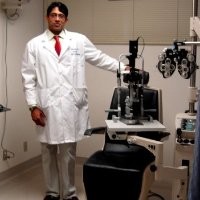In a significant advancement for a rare inherited vision disorder, gene therapy has been credited with drastically improving the eyesight of patients, with some reporting an incredible 10,000-fold enhancement. This groundbreaking clinical trial was conducted by the Perelman School of Medicine at the University of Pennsylvania, with the findings published in The Lancet.
The disorder in question, Leber congenital amaurosis, is a result of mutations in the GUCY2D gene, crucial for producing proteins essential for sight. Known as LCA1, it affects fewer than 100,000 people worldwide and can cause severe vision loss from infancy.
The study’s participants, comprising 15 individuals including three children, had severe vision impairments, with 20/80 vision being the best measure. This meant that what a person with typical vision could discern at 80 feet, these patients would need to be at least 20 feet from. Traditional vision correction methods, such as glasses, offer minimal aid as they cannot correct the genetic anomalies causing such conditions.
In the trial, the gene therapy ATSN-101 was tested at various dosages. Derived from the AAV5 microorganism, it was surgically introduced beneath the retina. Three adults received one of three dosages: low, middle, and high in the initial phase. Each dose level was reviewed for safety before the next was administered. A subsequent phase saw the highest dosage given to both an adult and a pediatric group, each comprising three individuals, again following safety checks.
The therapy’s impact was seen quickly, often within a month, and lasted at least a year. Three out of six patients who received the highest dosage and completed a mobility course under different light conditions achieved the highest possible score. Other evaluations used eye charts or gauged the dimmest light flashes patients could perceive in darkness.
Of those who received the highest dosage, two experienced an extraordinary 10,000-fold improvement in vision. “Despite anticipating substantial vision enhancement in LCA1, we were unsure how patients’ photoreceptors would respond to treatment after years of blindness,” said Artur Cideciyan, PhD, the study’s lead author. “It’s gratifying to see a successful multi-center trial proving gene therapy’s remarkable efficacy.”
The primary objective of the study was to assess the gene therapy’s safety and the impact of varying dosage levels. While some side effects were noted, the majority were related to the surgical procedure itself, such as conjunctival hemorrhage, which healed, and eye inflammation, which was reversed with steroids. No serious side effects were linked to the study drug.
This promising development follows another successful trial at Penn, which used CRISPR-Cas9 gene editing to enhance the sight of patients with a different form of LCA related to mutations in the CEP290 gene. “The success of recent clinical trials, along with our previous experience, brings hope for a feasible treatment for about 20% of inherited retinal degeneration cases causing infantile blindness,” said Tomas S. Aleman, MD, a co-author of the new study.
Looking ahead, approval of this experimental medicine for clinical use will require a further trial, in which participants are randomly allocated a treatment dose, and both patients and investigators are kept in the dark about who receives what, to avoid potential bias in the results.
This study was funded by Atsena Therapeutics, Inc., and two of the paper’s authors, Andres K. Lauer, MD, and Mark Pennesi, MD, PhD, are members of the company’s clinical and scientific advisory board.


Comments are closed for this post.